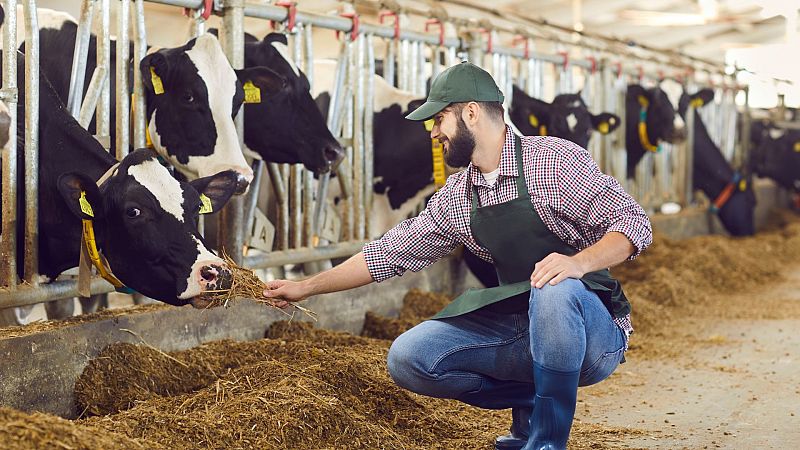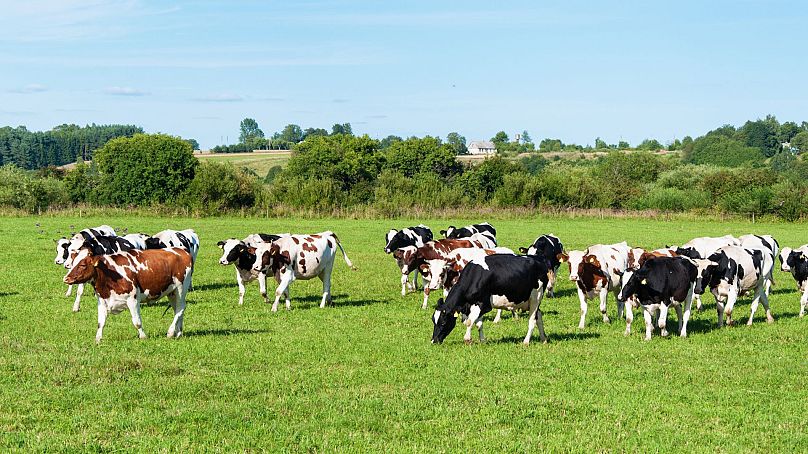Burping cows, Bovaer and boycotts: The anti-methane additive that’s taking social media by storm

The controversy began last week after several British supermarkets teamed up with the Danish-Swedish company Arla Foods to announce a 90-day trial of Bovaer, a new feed additive that aims to cut methane emissions from cows.
Retailers Tesco, Aldi, and Morrisons joined forces with Arla Foods to trial the additive that hopes to tackle methane produced by cows during digestion on 30 British farms.
Arla Foods owns the UK’s largest dairy cooperative and features Cravendale milk and Lurpak among its popular dairy items.
Both the UK and EU food safety authorities approved Bovaer prior to the trial, stating that it is safe for use and does not affect the quality of milk. It has also been authorised in several other countries, including Australia, Brazil and Canada.
However, environmental groups and consumers have raised concerns over the additive’s long-term effectiveness and impacts on animal and human health.
What is the methane additive, and how does it work?
Greenhouse gas methane is widely known to contribute to climate change. In dairy farming, methane is produced when cattle eat: they have a compartment in their stomach called the rumen that ferments digested food, which cows then expel by belching.
Bovaer seeks to suppress the enzyme in a cow’s stomach and reduce methane emissions from dairy cows by 27 per cent and by 45 per cent in beef cattle.
In practical terms, each cow that’s given a quarter of a teaspoon of the additive could reduce CO2e emissions by one tonne each year, according to dsm-firmenich, the science-based company that began developing the food supplement 15 years ago as part of its ‘Project Clean Cow’.
Already, Bovaer has been tested at 100 farms in more than 20 countries.
The supermarkets involved in the British trial said in a shared statement: “Through collaboration as part of Arla’s FarmAhead Customer Partnership, we have the ability to address some of the climate challenges facing our food system. It is this collective approach that is really going to make a difference.”
The Bovaer initiative is part of Arla’s wider environmental plan to reduce 30 per cent of CO2 emissions from its dairy production by 2030. If successful, it will be rolled out to more British farmers.
Backlash to the methane-busting additive on social media
While most of the retail industry welcomed the UK trial, several consumers took to social media to raise concerns about the methane additive.
“I don't think I'll be drinking this again!!!” declared one X user as they tossed a carton of Cravendale milk in the bin.
The methane supplement is made of silicon dioxide, propylene glycol and the organic compound 3-nitrooxypropanol (known as 3-NOP).
Last year, the UK’s Food Standards Agency reported that while 3-NOP was safe to use in animal feed additives and is not corrosive to skin, it “should be considered corrosive to the eyes, a skin irritant and potentially harmful by inhalation”.
“Shoppers are voting with their feet after it’s revealed certain brands are using tainted experimental drug based products to help lower methane emissions in cattle,” said another X user.
Rumours also circulated on social media that Microsoft co-founder Bill Gates was involved in the additive’s development and part of the ‘conspiracy’, which has been vehemently denied by Dsm-firmenich.
Gates did, however, invest millions of dollars earlier this year into a rival start-up called Rumin 8, which similarly produces methane-reducing bovine products.
British shoppers were quick to boycott retailers
Many British consumers are now calling for a boycott of the supermarket chains involved in the trial.
One X user challenged Aldi on its customer service response, while others have been returning Arla products to the store.
“Stop poisoning our food @ArlaDairyUK and @Tesco stop trying to kill your customers!” posted one X user, while another called it a “climate scam”.
As the fury continues, consumers have been criticising other brands on social media who may have used the methane additive in their products, including Cadbury, Costa Coffee, and McDonalds, although Euronews Green has yet been unable to confirm these claims.
Meanwhile, several other large UK-based dairy companies, including Yeo Valley Organic and local organic dairies, were quick to confirm that they don’t use the methane additive.
“The main components that make up Bovaer® are not included in the list of approved products/compounds and as a result, Bovaer® would not be permitted under organic standards and for use in organic farming”, flagged The Soil Association, the UK’s organic certifying body.
Other X users argued that we should be removing chemicals from the food system rather than adding more.


